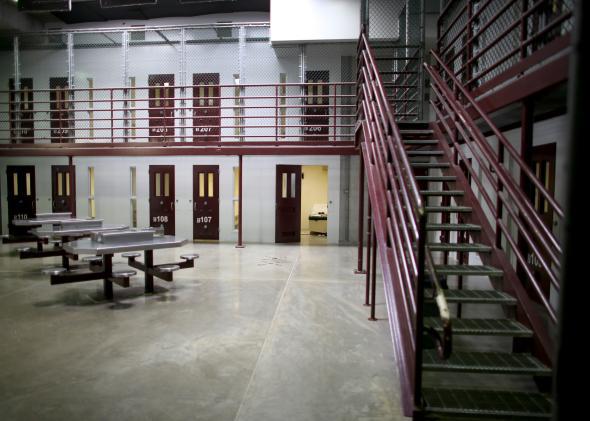The AP is out this morning with a story about “Penny Lane,” the double-secret compound at Guantánamo Bay that housed accused terrorists the CIA hoped to turn into double agents. After setting up select prisoners in Penny Lane’s relatively cushy confines, a handful of prisoners were selected to spy on the same terrorist organizations they may have worked for.
The program started in 2003 and ended in 2006. (Guantánamo’s last prisoner arrived in 2008). The CIA was especially keen to recruit former al-Qaida operatives, and used a combination of cash incentives, promises of protection, and threats to convince detainees to spy for the U.S.—the AP reports the agency has a secret account called “Pledge” specifically to pay the agency’s informants.
The amenities inside Penny Lane were luxurious by Gitmo standards—the story describes “private kitchens, showers and televisions,” and says prisoners were provided with pornography upon request. They even had real beds. (If you have Instagram, AP photog Charles Dharapak is a great follow. He’s been posting photos of life inside Gitmo).
The irony of the story is palpable: While the CIA set some actual terrorists free as double agents, other Gitmo prisoners who face no formal charges, like Mohamedou Ould Slahi, remain in habeas corpus purgatory*:
From the Bush administration descriptions of Guantanamo Bay prisoners at the time, the CIA would have seemingly had a large pool to draw from. Vice President Dick Cheney called the prisoners “the worst of a very bad lot.” Defense Secretary Donald H. Rumsfeld said they were “among the most dangerous, best trained, vicious killers on the face of the Earth.”
In reality, many were held on flimsy evidence and were of little use to the CIA.
Of the 779 people who have been interned at Guantánamo Bay, roughly three-quarters were released, the majority of whom were released before President Obama assumed office. But Obama’s 2008 campaign promise to close Gitmo fizzled out soon after he was sworn in:
President Barack Obama took an interest the program for a different reason. Shortly after taking office in 2009, he ordered a review of the former detainees working as double agents because they were providing information used in Predator drone strikes, one of the officials said.
A program is condemnable up until the point when becomes useful.
*Correction, Nov. 26, 2013: This post originally misspelled Mohamedou Ould Slahi’s first name.
